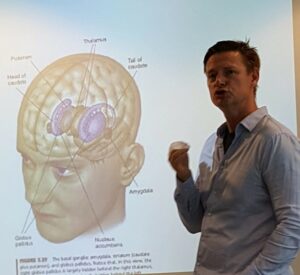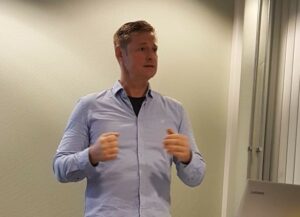and completely without side effects
Doctor Michael Ballke is amazed that exercise and training as treatment for depression is so
underestimated and undercomminicated here in Norway. “Using training as recovery and treatment for these disorders is almost non-existent in the Norwegian health care system. Both preventative measures and physical activity are often not recommended. The pharmaceutical industry basically has unlimited financial resources and enormous power. Antidepressants are a huge form of business for the pharmaceutical industry as well, especially when you take into consideration of how many Norwegians suffer from depression. Based on available research, I have no concerns with recommending training as a treatment for this societal sickness,” Michael Ballke tells us. He currently holds lectures about training and mental health up here at Helseparken. His thoughts are worth giving a listen.
Les om Leo sin kamp fra alvorlig syk og til å få gnisten tilbake!

Increasing
“Today, depression is an increasing public health crisis, leading to the exponential rise in the sick and diagnosed in our communities. There are different levels, and for some medical relief is justifiably needed. At least for a period of time. There is nevertheless the fact that applying training to your daily life as well, will provide a quicker and more efficient path to recovery. Even though the research on this subject does not provide concrete answers to all our questions, the studies show that these types of patients are positively affected by this form of treatment. It is also quite clear that the majority of these patients wouldn’t transition naturally into a normal training center, and therefore require follow-ups and assurances of a safe environment, Ballke elaborates.” He recommends the EviBase clinic up at Helseparken in Sandefjord as a very good alternative.
A better life
Doctor Ballke is clear is his position that training as a form of treatment has no negative side effects, and provides the majority of patients with a fantastic, rejuvenated feeling. “One thing is that through regular training, the risk of other dangerous diseases and sicknesses is radically reduced. The training is also known to cause a shift toward positive ways of thinking. The brain benefits the most when we participate in physical activity. Our creative abilities are also developed. You can say that the brain is the star in evolutions masterpiece. We further increase our self-esteem and the belief that we have in ourselves. Not to mention that training allows us to prevent and repair our physical conditions that increase the likelihood of depression. Essentially, training optimizes the number of neurotransmitters in the brain and contributes to the reduction of negative thoughts,” Balke tells us. It is quite clear that this is a topic that makes his mind race as well.
Les mer her om fastlege Hans Jacob Gravdal og EviBase sine erfaringer om trening som medisin!

Dementia and Alzheimer’s
These two words are also diseases that scare most people, and we understand that many of us are diagnosed with these relentless diseases. Especially the older we get. Research shows that the combination of genetics and lifestyle affect the development of these diseases. “Something that we know for certain is that physical activity is the most effective strategy to help combat dementia. Regular movement has reduced the risk significantly. Normal symptoms are irritation, appetite and general aggression. Training slows this down, but also had no side effects and reduces the risk that we are diagnosed with other serious conditions. In my opinion, it is disappointing that controlled forms of exercise and training alongside follow ups by health professionals is no longer a part of the Norwegian healthcare system. It’s astonishing, Ballke passionately explains.
The connection between mind and body
As much as 20 percent of all women and about 10 percent of all men in Norway will suffer from some form of depression over the course of their life. And for social accounts the data is somewhat misleading, with those affected often suffering from worse effects. The frequency of cases is increasing, as is the amount of people that are placed on permanent disability. “Research shows that the cause is likely due to the combination of psychological, hereditary, and biological factors. Us humans react differently to serious life events and the emotional strain of divorce, a death in the family, or the feeling of defeat can leave lasting consequences for those who suffer from depression. Depression is the unbalance of neurotransmitters in the brain. It is also caused by the absence of growth hormones, chronic inflammation of the nerve tissue and various structural changes in crucial areas of the brain. There is always a lot going on up in the brain, especially when you are experiencing various forms of heartache,” Ballke sympathetically tells us.
Training as medicine to help combat depression
Michael Ballke is definitely not a huge supporter of antidepressants or so called “happiness” pills but understands that some forms of depressions are needed to be treated with medication and other varieties of therapy. “Studies shows that antidepressants as treatment for normal bouts of depression do not produce the desired effect compared to using regular training as an alternative method. It is a fact that that whatever you place your belief in can contribute towards your mental health in a positive manner,” Doctor Ballke explains. He believes that research-based training will be more widely accepted in the future, even becoming norm. He is usually right about these things…

